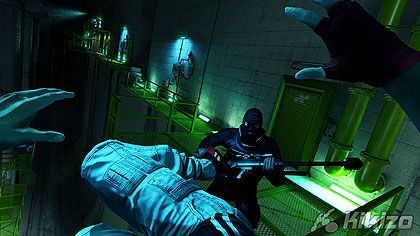Mirror's Edge Interview with EA DICE
We sit down for a chat with Sweden-based DICE's producer of Mirror's Edge, Manuel Llines.
Page 2
Kikizo: I think the way you've managed to make the player feel as if they're inhabiting Faith's body is incredible - especially when you're crossing a narrow beam, and you see your arms go out to either side. My heart skipped a beat!
Llanes: One of the aims - and it maybe sounds presumptious - was to elicit that sort of reaction. But it was one of the core aims... I love this because I can enjoy the adrenaline and the dread part of that without crying. [laughs]
Kikizo: Do you think players will become desensitised to that level of risk? And on a similar note, how are you handling death?
Llanes: That's a good question. It's about balancing - it's about balancing the difficulty and balancing the checkpoints. We have checkpoints - our aim is that this is a game that should not be frustrating first time. You should still be scared but on the other hand the difficulty level should... take care of you, if that makes sense?
Another thing people get is that... There is something - maybe I'm speaking personally, I'm not speaking for everyone - but I think those types of emotion and feelings are so [radically] part of our DNA as stacks of bone and flesh that will shatter... we sort of know it in our DNA. So every time you feel that - if it's created well enough in-game or in a movie - I think it's a good game.
Kikizo: Can you tell us a bit about the design principles - both in terms of Faith herself, who is beautiful, and in terms of the futuristic city backdrop? Llanes: Well when it comes to the city, gameplay and art - they came together a lot. We needed an environment that was easy to read, we wanted a city that story-wise... The story was written by Rhianna Pratchett, the daughter of Terry Pratchett -
Kikizo: Yeah, we've known Rhianna for a while.
Llanes: OK, well she's the author. We needed a story that was believable - I think believability is the keyword with this game. Why? The story is believable and the city is contemporary: we had inspirations like Dubai and New York and Tokyo - all sorts of places. And yes it's a futuristic society but it's not Orwell, it's not 1984 - it's a city where people are happy.
Everybody who gave up their freedom has clean streets, no crime or pollution - they're really happy about it. Yes, some people were marginalised and pushed to the edge of the mirror, which is what we call the city, [people] like Faith, because they were not ready to give up - to give up information, for example.
So the goal, to go back to your question, is that in the end its focussed, it's stylised but it's a mix of factors. And Faith herself is part of that - it's about building an athletic character who... through the situation and her motivations and the story becomes a heroine. But she doesn't have secret powers and all that. She's very athletic, definitely... but we needed somebody believable, and to be honest we wanted somebody who was not going to alienate any players, who was not going to portray the stereotypical bimbo or anything like that...
It's clichéd but it's a little bit about making a game that you would like to play, a game that you would like someone else to make for you. [laughs]











 Satoru Iwata Video Interview - the late Nintendo president spoke with Kikizo in 2004 as 'Nintendo Revolution' loomed.
Satoru Iwata Video Interview - the late Nintendo president spoke with Kikizo in 2004 as 'Nintendo Revolution' loomed. Kaz Hirai Video Interview - the first of Kikizo's interviews with the man who went on to become global head of Sony.
Kaz Hirai Video Interview - the first of Kikizo's interviews with the man who went on to become global head of Sony. Ed Fries Video Interview - one of Xbox's founders discusses an epic journey from Excel to Xbox.
Ed Fries Video Interview - one of Xbox's founders discusses an epic journey from Excel to Xbox. Yu Suzuki, the Kikizo Interview - we spend time with one of gaming's most revered creators.
Yu Suzuki, the Kikizo Interview - we spend time with one of gaming's most revered creators. Tetris - The Making of an Icon: Alexey Pajitnov and Henk Rogers reveal the fascinating story behind Tetris
Tetris - The Making of an Icon: Alexey Pajitnov and Henk Rogers reveal the fascinating story behind Tetris Rare founders, Chris and Tim Stamper - their only interview? Genuinely 'rare' sit down with founders of the legendary studio.
Rare founders, Chris and Tim Stamper - their only interview? Genuinely 'rare' sit down with founders of the legendary studio. The History of First-Person Shooters - a retrospective, from Maze War to Modern Warfare
The History of First-Person Shooters - a retrospective, from Maze War to Modern Warfare